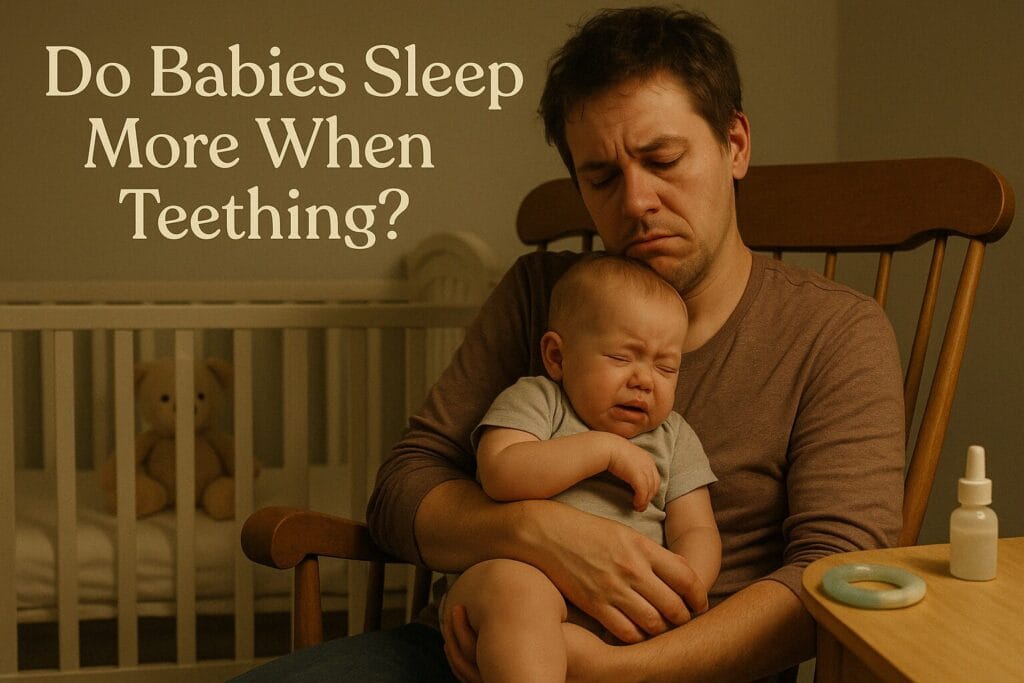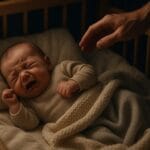Do Babies Sleep More When Teething? Everything Parents Need to Know
Teething is a major milestone in a baby’s life, but it also brings many challenges, especially when it comes to sleep. As a parent, you may be wondering: Do babies sleep more when teething? While some babies seem to sleep more during this phase, others may experience the opposite, with teething leading to more restless nights and frequent wake-ups. So, does teething make babies sleep more or not? Let’s explore what really happens to your baby’s sleep patterns when they start teething.
Table of Contents
The Challenge of Teething and Sleep: Do Babies Sleep More When Teething?
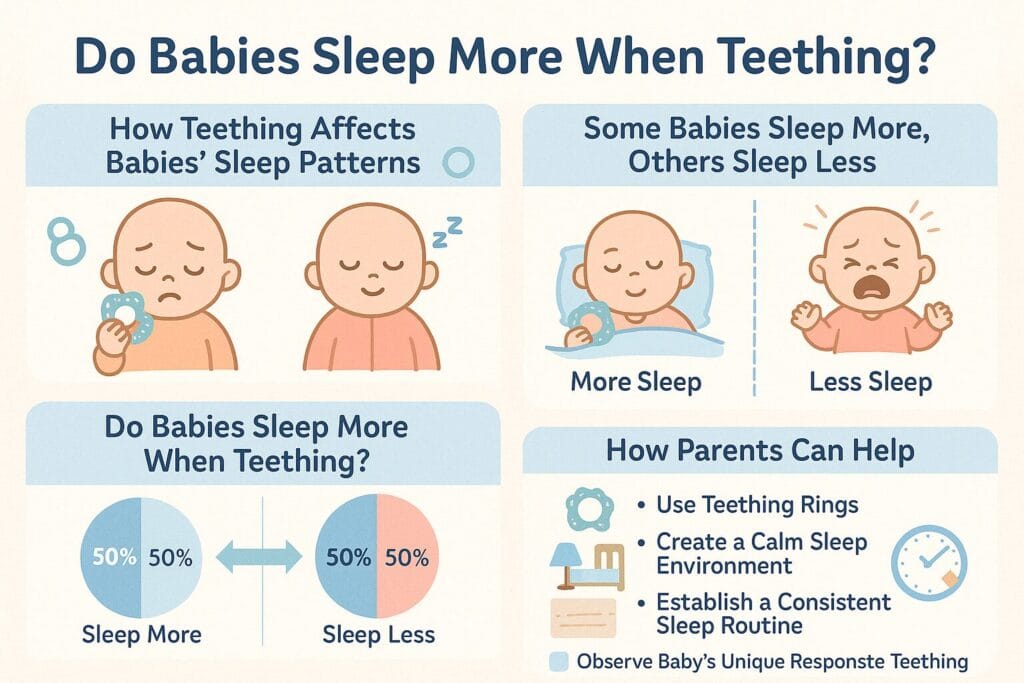
Teething can be an uncomfortable experience for babies, often leaving parents wondering, Do babies sleep more when teething? For some babies, the discomfort of new teeth coming in makes them feel extra tired and sleep for longer periods. However, for others, the pain may cause more irritability and restlessness, leading to less sleep. This variation in sleep patterns makes it hard to predict whether your baby will sleep more when teething. The truth is that Do babies sleep more when teething depends on the severity of their discomfort and how they react to it.
If you’re wondering, “Do babies sleep more when teething?” it’s essential to remember that every baby is different. While some babies might sleep more to cope with the extra stress, others may be more unsettled. Whether your baby sleeps more or less during teething, it’s helpful to understand what might be influencing their sleep.
This article explores whether babies sleep more when they’re sick and reveals 5 surprising reasons behind it. Learn helpful tips for comforting your baby during illness, from soothing techniques to creating a restful environment, ensuring they get the sleep they need to recover.
Understanding the Myths and Facts About Teething and Sleep: Do Babies Sleep More When Teething?
There’s no shortage of myths about teething and its impact on sleep. A common belief is that Do babies sleep more when teething due to the pain and exhaustion caused by teething discomfort. But is that true for every baby? Some myths suggest that teething always leads to more sleep disturbances, with babies waking up frequently due to pain. On the other hand, some believe that teething results in more sleep because babies are so tired from the discomfort.
The reality is, Do babies sleep more when teething isn’t a universal truth. Some babies may indeed sleep more, while others may experience disruptions in their sleep schedule. It’s crucial to separate fact from fiction and recognize that each baby’s experience with teething and sleep can vary widely. If your baby is more comfortable during teething, they may sleep better. If the discomfort is more intense, they may wake up more often.
What This Article Will Answer: Do Babies Sleep More When Teething?
So, Do babies sleep more when teething? In this article, we’ll dive deep into this common question and offer clear answers about how teething affects your baby’s sleep. While some parents find that their babies sleep more during teething, others notice more frequent wake-ups and a disrupted sleep schedule. It can be hard to determine exactly what to expect.
Throughout this guide, we’ll explain the reasons behind these sleep changes and help you understand why some babies sleep more when teething, while others sleep less. We’ll also share practical tips to help improve your baby’s sleep during this phase, regardless of how teething affects them. By the end of this article, you’ll have a better understanding of how teething impacts your baby’s sleep and whether it’s likely to cause more sleep or more wakefulness.
Final Thoughts on Teething and Sleep: Do Babies Sleep More When Teething?
If you’re wondering, do babies sleep more when teething? The answer isn’t simple, as it varies from baby to baby. For some, the discomfort of teething may cause them to sleep more, while for others, it can lead to disturbed sleep. Understanding your baby’s specific needs and responses during this phase can help you better support them and manage their sleep. If your baby is struggling to sleep, consider using soothing techniques like teething rings, and try to keep their sleep environment calm and consistent.
In the end, whether your baby sleeps more or less when teething, it’s important to remember that teething is a temporary phase. With the right strategies and plenty of comfort, your baby’s sleep patterns should return to normal once the teething process is complete.
The Mystery of Teething and Sleep: Do Babies Sleep More When Teething?
When your baby starts teething, you might wonder, Do babies sleep more when teething? Understanding how teething affects sleep is crucial in preparing for changes in your baby’s sleep routine. Teething is a big milestone, but it can also bring sleep challenges. Some parents report that their babies sleep more when teething, while others experience more frequent wake-ups. So, does teething make babies sleep more, or is it the opposite? Let’s dive into this mystery and explore how teething impacts sleep patterns.
This article offers 7 proven tips to help you transition your baby away from contact naps and enjoy better sleep for both of you. With practical strategies like gradually shifting to a crib and establishing a consistent sleep routine, you’ll create healthy sleep habits that promote restful nights for your baby and much-needed rest for yourself.
How Teething Affects Babies’ Sleep Patterns: Do Babies Sleep More When Teething?
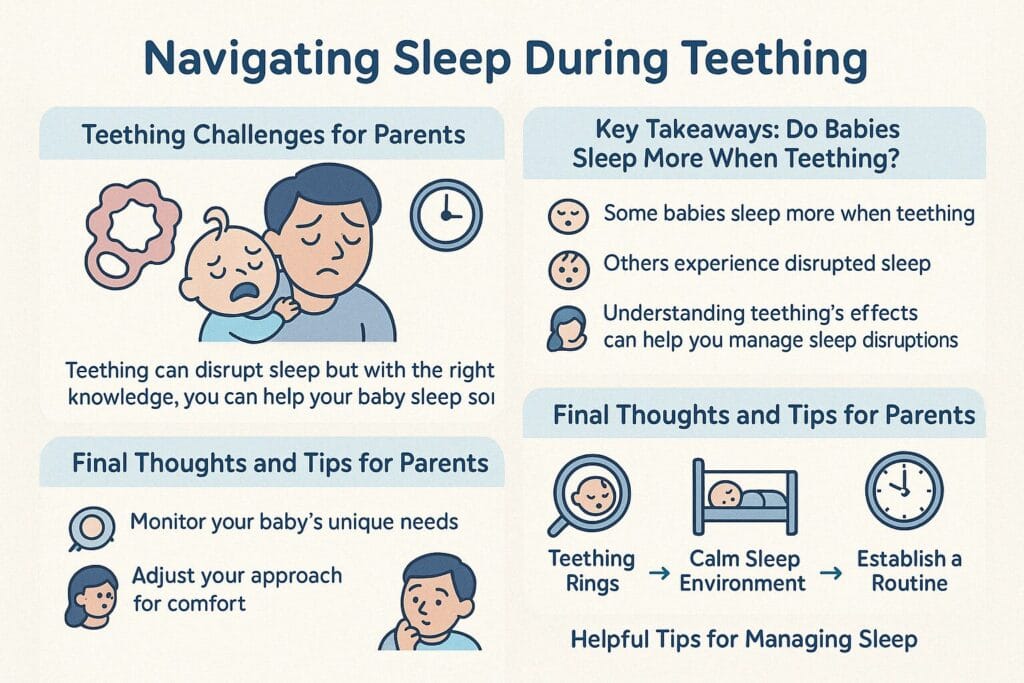
The discomfort caused by teething can lead to significant changes in your baby’s sleep patterns. Parents often find themselves asking, ‘Do babies sleep more when teething? ‘ or ‘Will teething cause sleep disruptions? ‘ The truth is, teething can have different effects on sleep. Some babies become more tired from the discomfort and sleep longer, while others may have a harder time sleeping at all due to pain or irritability. Whether Do babies sleep more when teething is true for your little one depends on how they react to the teething process and the level of discomfort they experience.
Teething can sometimes cause babies to feel extra tired, making them sleep more during the day or night. However, this isn’t always the case, and some babies may wake up more frequently or have trouble staying asleep due to the discomfort they feel. Understanding the possible effects of teething on sleep can help you anticipate changes in your baby’s routine.
Some Babies Sleep More, Others Sleep Less: Do Babies Sleep More When Teething?
Not all babies react the same way to teething, which is why parents often wonder, Do babies sleep more when teething? For some babies, teething causes them to sleep more because they are exhausted from the pain or discomfort. The pain from teething can tire them out, leading to longer naps or more restful sleep. On the other hand, some babies experience the opposite, waking up more frequently or struggling to fall asleep due to the discomfort they feel in their gums. So, Do babies sleep more when teething? The answer truly depends on how your baby’s body responds to teething.
If your baby is experiencing a lot of discomfort, they may become extra fussy and have trouble settling into a sound sleep. This could result in more wake-ups or shorter sleep stretches. In contrast, other babies may sleep soundly as a way to cope with the discomfort. Do babies sleep more when teething? For some, yes, but for others, teething can result in sleep struggles. It’s essential to understand your baby’s unique response to teething and its effects on their sleep.
How Parents Can Help: Do Babies Sleep More When Teething?
If you’re asking, do babies sleep more when teething, and your baby seems to be struggling with sleep, there are several things you can do to help ease their discomfort and improve their sleep quality. Teething pain can make it difficult for babies to get the rest they need, but there are practical strategies that can help. One effective method is using teething rings, which can soothe sore gums. You might also want to try massaging your baby’s gums with a clean finger to offer relief.
Creating a calming sleep environment can also make a big difference. A quiet, dimly lit room can help signal to your baby that it’s time to sleep, even if they are a little uncomfortable. Establishing a consistent sleep routine can also provide comfort, as babies tend to sleep better when they feel secure in their routine. If your baby is asking, do babies sleep more when teething? The answer could be yes, with the right strategies in place to ease their discomfort and improve their chances of getting a restful night.
Understanding Baby Sleep Patterns During Teething: Do Babies Sleep More When Teething?
Every parent’s experience with teething is different, leading to the ultimate question: Do babies sleep more when teething? Teething affects each baby in unique ways, and while some babies may sleep more, others may experience restless nights and frequent wake-ups. Understanding how teething impacts sleep is crucial, as it helps parents manage their baby’s sleep patterns during this developmental phase. Let’s take a closer look at how teething influences sleep and why it affects some babies more than others.
The Science Behind Sleep and Teething: Do Babies Sleep More When Teething?
According to research, do babies sleep more when teething? Some studies suggest that babies may either sleep more or less, depending on how their body reacts to the pain and discomfort of teething. The pain associated with teething can affect sleep patterns in different ways. Some babies may become extra tired from the discomfort, which leads them to sleep more, while others may experience disrupted sleep due to increased irritability or pain. Understanding the science behind teething and sleep helps explain why do babies sleep more when teething is a question that can have multiple answers.
The discomfort from teething can trigger various responses in babies. For some, it leads to a deeper sleep as their bodies attempt to cope with the discomfort. For others, the pain may cause restless nights, leading to shorter sleep cycles and more frequent awakenings. Therefore, do babies sleep more when teething depends largely on how your baby’s body responds to the teething process.
Signs That Teething is Affecting Your Baby’s Sleep: Do Babies Sleep More When Teething?
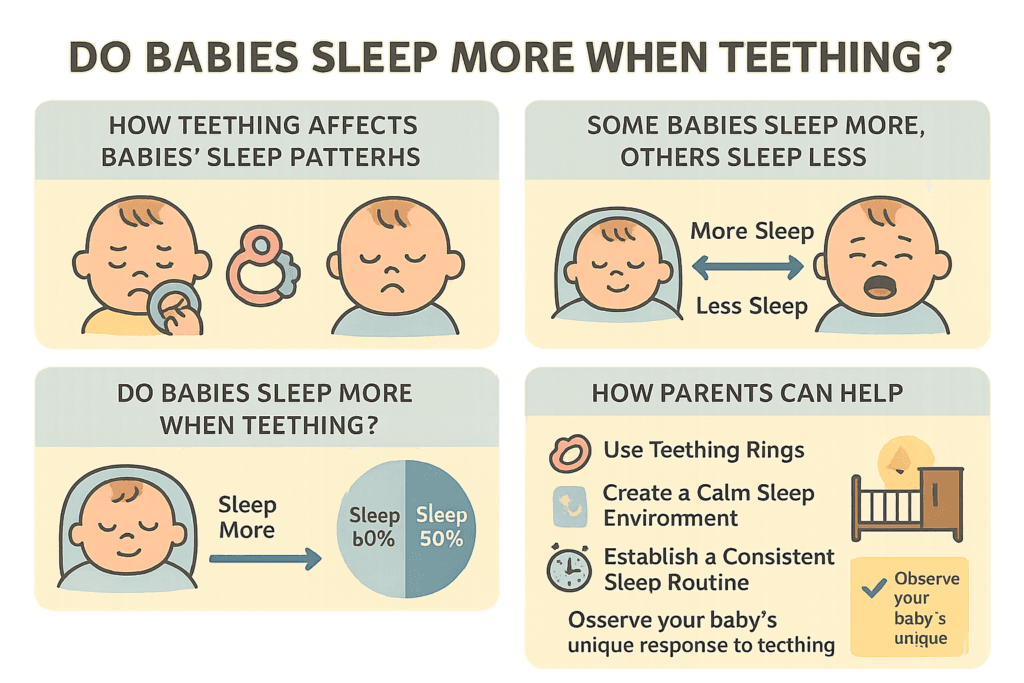
If you’re wondering, do babies sleep more when teething? One key sign to look for is how teething symptoms, like drooling, irritability, and discomfort, affect your baby’s sleep. Teething can cause changes in your baby’s sleep habits, and recognizing these signs can help you determine whether teething is affecting your baby’s sleep.
Some common signs that teething might be affecting your baby’s sleep include increased fussiness, difficulty falling asleep, and waking up more frequently at night. If you notice that your baby is suddenly sleeping longer than usual, it might be a sign that they are more exhausted from the discomfort of teething. On the other hand, if your baby is waking up more often, it could be because the pain is preventing them from staying asleep. Do babies sleep more when teething? It’s often a matter of paying attention to these signs and responding appropriately to soothe your baby.
Are you struggling to get your overtired newborn to sleep? Discover 7 proven strategies to help your baby fall asleep fast and effectively. These expert tips will ensure a peaceful night’s rest for both you and your little one.
Practical Advice for Parents During Teething: Do Babies Sleep More When Teething?
Whether your baby is sleeping more or less due to teething, it’s important to follow a few key strategies to ensure they are comfortable and well-rested. If you’re asking, do babies sleep more when teething? It’s essential to understand that the answer depends on your baby’s unique response to teething discomfort. Some babies may sleep more, while others might struggle to sleep due to the pain.
To help your baby get the rest they need, consider offering teething rings to relieve discomfort, creating a calming sleep environment, and establishing a consistent bedtime routine. Keeping your baby’s room quiet and dimly lit can help signal that it’s time to sleep, even if they are experiencing discomfort. Additionally, soothing techniques like gentle rocking or soft lullabies can provide comfort and help your baby relax enough to fall asleep. By using these strategies, you can help improve your baby’s sleep quality, whether they sleep more or less during the teething stage.
1. Do babies sleep more when teething?
Yes, many parents wonder, do babies sleep more when teething, and for some babies, the answer is yes. The discomfort and pain of teething can make babies more tired, leading them to sleep longer. However, this isn’t true for every baby, as some may experience disrupted sleep instead.
2. Why do babies sleep more when teething?
Do babies sleep more when teething? For some babies, the discomfort caused by teething can tire them out, leading to extra sleep. Their bodies may need more rest to recover from the pain, which can result in longer naps or more sleep at night.
3. Can teething cause babies to sleep more?
Yes, for certain babies, teething can cause them to sleep more. The pain and irritation caused by teething often leave babies feeling more exhausted, and as a result, they may sleep longer or more deeply during this time.
4. Do babies sleep more when they are teething or less?
The answer to Do babies sleep more when they are teething depends on the baby. Some babies sleep more because the pain tires them out, while others may experience more disruptions in sleep due to discomfort. It’s different for each baby.
5. Do babies sleep more when teething than when they’re not teething?
In some cases, yes—do babies sleep more when teething compared to when they’re not teething? The discomfort from teething can lead babies to sleep more to recover from the irritation. However, this depends on the baby and how they respond to the teething process.
6. How can I tell if teething is causing my baby to sleep more?
If you’re wondering, do babies sleep more when teething? Keep an eye out for signs like excessive drooling, irritability, or a noticeable change in sleep. If your baby is sleeping more than usual, teething could be the cause of their increased rest.
7. Do babies sleep more when teething because of pain?
Yes, do babies sleep more when teething can be linked to the pain of new teeth pushing through the gums. The discomfort may cause babies to become more tired, which can lead them to sleep longer than they normally would.
8. What should I do if my baby sleeps more when teething?
If you notice that your baby is sleeping more during teething, make sure their sleep environment is soothing and comfortable. Do babies sleep more when teething because they’re extra tired, so creating a calm, peaceful atmosphere can help them sleep soundly.
9. Do babies sleep more when teething or is it a myth?
It’s not a myth—do babies sleep more when teething is true for some babies. While teething can sometimes cause sleep disruptions, it can also lead to increased sleep as babies recover from the discomfort they feel.
10. Is it normal for babies to sleep more when teething?
Yes, it is normal for some babies to sleep more when teething. As do babies sleep more when teething can vary from baby to baby, some babies may sleep more to cope with the pain, while others might experience restlessness and sleep disruptions.
IV. Conclusion: Do Babies Sleep More When Teething?
As a parent, figuring out whether do babies sleep more when teething is a common concern. Teething can disrupt your baby’s sleep routine, but understanding how teething affects sleep will give you the confidence to handle this developmental milestone. By knowing what to expect, you can help your baby get the rest they need, whether they sleep more or less during teething. Let’s review the key takeaways and offer final tips to ensure your baby gets enough sleep during this phase.
Key Takeaways: Do Babies Sleep More When Teething?
While there’s no one-size-fits-all answer to do babies sleep more when teething, understanding how teething affects sleep can help you create a better sleep routine for your baby. Some babies may sleep more due to exhaustion from the discomfort of teething, while others may experience sleep disruptions, waking up more frequently during the night. The key takeaway is that teething can impact each baby differently, and it’s essential to observe your baby’s specific signs to understand how teething is affecting their sleep. Knowing the signs can help you decide whether to adjust their sleep environment or routines to make them more comfortable.
Final Tips for Parents: Do Babies Sleep More When Teething?
While do babies sleep more when teething varies from baby to baby, the following tips will help ensure that your baby gets the rest they need during this challenging phase. If your baby is sleeping more during teething, keep their environment calm and soothing, offering them the comfort they need. If teething is causing more frequent wake-ups, consider using teething rings or gently massaging their gums to provide relief. Establishing a consistent bedtime routine can also help create a sense of security, making it easier for your baby to settle into sleep. By following these tips, you can help your baby navigate teething with better sleep and more comfort.

